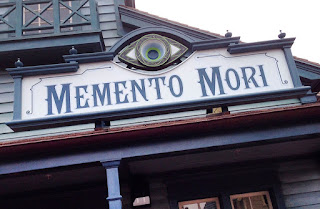What could I possibly say about "Hamlet" that hasn't been said before? It's likely the most discussed, most studied play in history. There are some really interesting theories out there, my favorite being that Gertrude actually killed Ophelia, or that Claudius isn't really a bad guy, and that old King Hamlet was a pretty crappy husband, as Patrick Stewart's version of Claudius seems to predict.
After all, if old King Hamlet was such a paragon of virtue, why is his spirit in hell? The ghost claims that he is trapped there due to dying without last rites (murder will do that to a person,) but if he lived such a sinless life as everyone else in the play claims, why is his spirit shipped straight to damnation? And would a virtuous spirit encourage his son to commit murder, which would lead to the very same fate for that son?
This, of course, is part of Hamlet's procrastination in the pursuit of revenge for his father - how can he be sure that the ghost he has seen is truly that of his father, and not some devil come to tempt him to sin? The play-within-a-play, "The Mouse-Trap," is set to catch Claudius out in his reaction, and that serves as proof enough for Hamlet, but is it truly proof?
We, as the audience, learn via a monologue in prayer that Claudius did indeed murder his brother, but the monologue itself is curious. It's repentant - he writhes in fear and agony over his past actions, but like Marlowe's Faustus, denies himself God's grace because he refuses to deny himself the rewards of those actions. He does not believe he can be forgiven, because he refuses to give up the crown and queen he has gained from the murder. But he does feel remorse, a feeling that Hamlet does not possess after the killing of Polonius, and then of course after Polonius's murder, Claudius dispatches Hamlet to England, to be murdered as well, which in turn leads to the murders of Rosencrantz and Guildenstern.
In the end, everyone who dies in the play dies without last rites, and Ophelia is even refused proper burial due to her suicide. But last rites as a passage to heaven is a curiously Catholic idea for a Protestant nation under Queen Elizabeth I. Of course, the people of Elizabeth's England had undergone several iterations of Christianity within their own lifetimes by the time "Hamlet" was written, so it's entirely possible that this confusion - "how do we know what lies on the other side of death, or the proper road to get there?" was one well lodged within the hearts and minds of the English.
There is evidence to suggest that Shakespeare's father was a private, hidden Catholic, and that he might have been an alcoholic, and that he died right around the time "Hamlet" was written. Scholars suggest that Hamlet's description of how love of ale leads to a man's downfall in Act I.iv. may have been inspired by John Shakespeare:
"So, oft it chances in particular men,Was "Hamlet" inspired by Shakespeare's musings on death, religion, the afterlife, and his father? Critics of course remark on the main character's name, and its similarity to Shakespeare's son, Hamnet, who died in 1596, at least four years before "Hamlet" was written and performed. But the death of Shakespeare's father would have been much more recent, and much closer to the themes of the play. Did Shakespeare worry about his own father's fate after death? Clearly, he was coming to grips with how death affected the body - the jesting with Yorick's skull is proof of that. But what of the soul?
That for some vicious mole of nature in them,
As, in their birth--wherein they are not guilty,
Since nature cannot choose his origin--
By the o'ergrowth of some complexion,
Oft breaking down the pales and forts of reason,
Or by some habit that too much o'er-leavens
The form of plausive manners, that these men,
Carrying, I say, the stamp of one defect,
Being nature's livery, or fortune's star,--
Their virtues else--be they as pure as grace,
As infinite as man may undergo--
Shall in the general censure take corruption
From that particular fault: the dram of ale
Doth all the noble substance of a doubt
To his own scandal."
Perhaps this brings us to the play's end, where Hamlet begs his friend Horatio to tell his story. Memento mori were popular items at the time, symbols of death to remind wearers of their mortality, often in the shape of rings or found in sculpture or paintings. One of the earliest textual memento mori is a 13th century Icelandic poem, the Hávamál, supposedly written by Odin, goes as follows:
Deyr fé, Animals die,
deyja frændur, friends die,
deyr sjálfur ið sama; and thyself, too, shall die;
ek veit einn at aldri deyr, but one thing I know that never dies
dómr um dauðan hvern. the tales of the one who died.
People die, and what happens after their death is unknown. But the stories of their lives live forever. Something worth remembering.
 |
| Edinburgh. St. Cuthbert's Churchyard. Grave of James Bailie (died 1746). |
 |
| Tomb of Pope Alexander VII, St. Peter's Basilica, Rome, Bernini, 1678. |
 |
| St Nicholas' Church in the village of Ash, in the Dover District of Kent, England, sometime between mid-17th century and mid-18th century. |
 |
| Sign for shop outside of Haunted Mansion attraction, Walt Disney World, FL. |

No comments:
Post a Comment